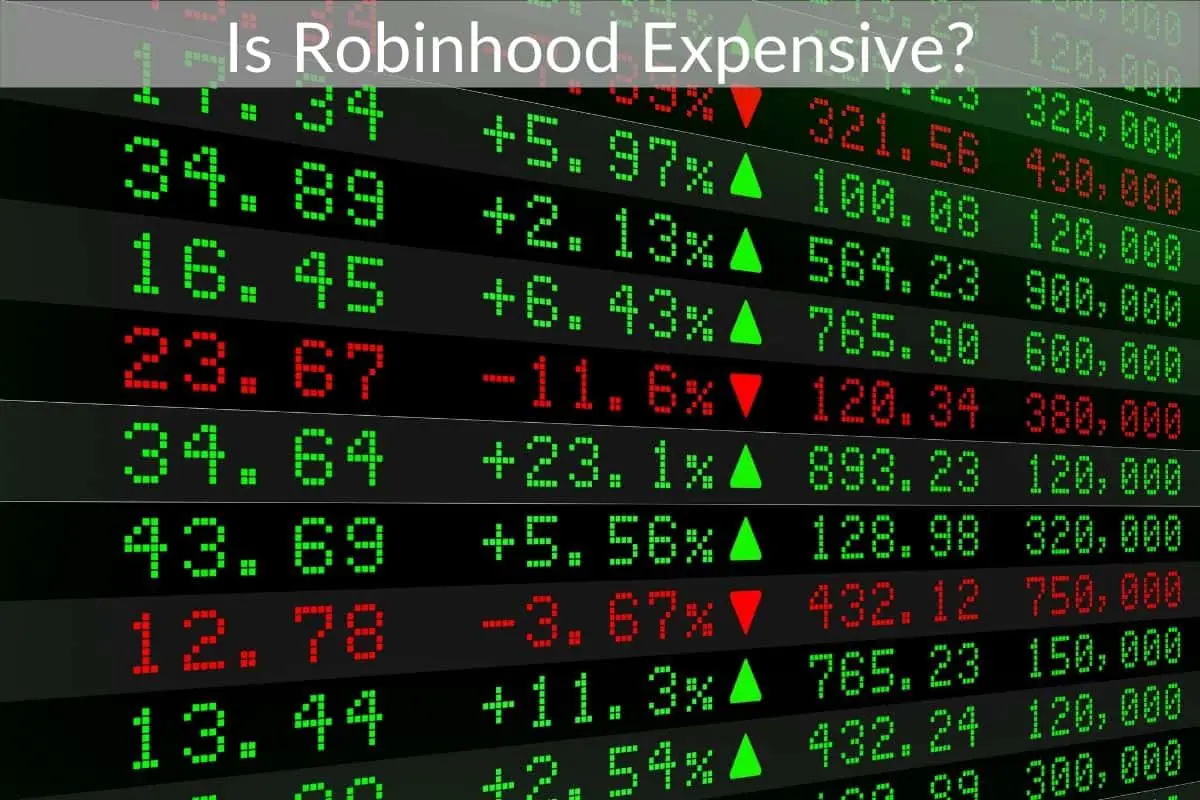Table of Contents
*This post may contain affiliate links. As an Amazon Associate we earn from qualifying purchases.
It’s safe to say, obtaining wealth is a goal many people — myself included — share. While there are a plethora of ways to generate wealth, one of the best has to be investing in stocks.
In the past, stock investing was difficult and reserved mostly for Wall Street-types. However, with apps like Robinhood readily available on your smartphone, anyone can invest today.
With that being said, you may be wondering if Robinhood is expensive?
Trading stocks, options, and crypto on Robinhood is actually free so it isn’t expensive at all. They do charge for some premium services but the trading itself is free.
While the app itself is free to use, there are situations where you may end up spending money when using Robinhood. These include wire transfers, foreign trading, and regulatory fees, among others.
Stock trading can seem like a daunting prospect for beginners but with apps like Robinhood that have made trading stocks free it is getting easier and easier for beginners to trade stocks or options.
In this article, I will explore some of the fees associated with Robinhood to help you decide whether the app is right for you or not.
What Does It Cost To Get Started With Robinhood?
Is Robinhood expensive? Fortunately, Robinhood is free. That’s right. Free. Robinhood is a zero-fee discount broker founded in 2013.
But what about the costs to get started? Does it cost you to put money into an account or is there a minimum to get started?
There are no fees to open an account with Robinhood or to get started. Robinhood also doesn’t have a minimum account balance so you can get started with just a few dollars if you like.
Robinhood is regulated by US financial authorities including the US Securities and Exchange Commission (SEC) and the Financial Industry Regulatory Authority (FINRA) so any money you deposit is safe.
However once you invest in a stock or option the value can go up or down depending on how that investment performs.
Robinhood states their mission on its website: “Our mission is to democratize access to the financial markets”. They do a good job of that by not requiring a minimum balance or any fees to get started.
Is It Worth It To Use Robinhood?
If you have ever experienced trading with other firms like Ameritrade or E*trade, then you know about commission fees.
At each of these stock brokerages you could pay up to $10-15 per trade. This means that a typical day trader could rack up over $100-$200 in commission fees daily.
Extrapolate that outward across a year. If you paid $100-$200 in fees in a day, then that would pay somewhere between $26,000-$52,000 each year. Yikes!
It’s easy to see why traders find the idea of free trades very attractive.
Robinhood is worth trying out if for no other reason than to see if you like the interface. Other brokerages now offer free trades as well but Robinhood really pioneered the concept.
Robinhood’s desktop interface is pretty clunky but trading with your smartphone by using the app is super simple. You might even have issues with over trading since you can literally trade from anywhere that you have cell service.
What Can You Trade For Free On Robinhood?
As I’ve mentioned earlier trading on Robinhood is free but what exactly can you trade on there for free?
The following items are free to trade on Robinhood.
- ETFs
- Stocks
- Options
- Certain Cryptocurrencies
These trades are free on Robinhood, including when using its pretty intuitive mobile app or it’s desktop website.
If you have a critical mind, you may be thinking, “That’s amazing! But how do they make money? What’s the catch?”
The site does have some other services which do help them make up for the unusual cost structuring. I’ll go into more detail about that in the section below.
Options Trading
Beyond just stocks and ETFs, Robinhood has also introduced options trading. The option service charges no commissions either.
Furthermore, there are zero fees for any assignments and exercises associated with options trading.
Cryptocurrency
Robinhood has also begun shifting toward cryptocurrency trading. Currently, you can trade:
- Bitcoin
- Ethereum
- Litecoin
- Dogecoin
Robinhood has also made an intimation that more cryptocurrencies will be available on the platform down the road.
There are zero commissions associated with executing digital currency trades.
In addition to these excellent features, the main brokerage account has no annual fee. This includes a low-balance fee or even an inactivity charge.
Robinhood also does not charge a termination fee to close your account.
Deposits and withdrawals via the ACH system are also free of charge. If you transfer a brokerage account into Robinhood, they will charge you nothing (although the other firm may charge for the transfer).
What Is The Catch With Robinhood Trading?
Robinhood is a business and therefore they must make money. It does have fees in some situations which make it different from the other firms previously described.
The main way that Robinhood makes money is through fees, subscriptions, and through being paid for order flow. Being paid for order flow means Robinhood sells your order information to a market maker which in turn means you will pay slightly more for each stock or option that you buy/sell.
This extra that you pay when buying and selling will typically only be a penny or two so it’s still far cheaper than traditional brokerages used to be. You can also make sure that you only pay a specific amount for an option, stock, or crypto by using a limit order instead of a market order.
Some additional ways that Robinhood makes money will be discussed below.
Hidden Fees
Robinhood charges $75 to transfer an account to a rival securities firm through the ACAT system. Paper statements are charged at $5 apiece, however paper confirmations are just $2.
In the event that your Robinhood account is restricted, the firm will impose a $10 surcharge for each trade.
Additionally, if you need to submit an order by phone then more costs are added. Having a representative submit an order will cost another $10.
Foreign Trading
Robinhood will also charge quite a bit for foreign trading. Their fee is $50 per trade.
You should also be aware that if you need to cancel or make changes to a foreign trade then there is another fee. The fee to augment a trade or cancel will be $15.
Robinhood has a lesser fee for Canada and Euroclear. Securities from Canada or Euroclear will only cost $35– $15 less than their typical fee.
Robinhood Membership
Robinhood has its own subscription service. They call this service Robinhood Gold, and they charge for it on a monthly basis.
Again, this feature is less common compared to other brokerages. Many charge a percentage rather than a flat monthly fee.
The precise amount you pay depends on the size of the account. Robinhood has a minimum of $2,000 for margin, which is standard.
The minimum you will pay is $6. That said, it does scale up in proportion with how much you want to borrow. The cap is placed at $200 per month.
For folks looking to borrow more than 50k, Robinhood will charge 5% on balances beyond that amount.
Wire transfers
A domestic wire transfer with Robinhood will cost $25 and a foreign wire transfer will cost $50. The domestic overnight check delivery fee is placed at $35 while a returned check costs $30.
An automated clearing house (ACH) or wire transfer also costs $30, if returned.
SEC Fee
Robinhood does make its customers pay regulatory fees (that the government charges them). For example, the SEC fee is $2.31 per 100k of principal.
It is noteworthy that this is only applicable for sales and does not include buy orders. Any fee is rounded up to the closest penny.
Another fee to consider is the Trading Activity Fee or TAF. This fee is equal to 0.0119¢ and is also only valid in the case of stock sales.
It is rounded up to the closest cent and the fee is restricted at a maximum of $5.95 per sale (but you would have to have a ton of money to get anywhere close to that amount).
Conclusion
So, is Robinhood expensive? No. It’s very generous in its fee structure and most of the time you will pay
virtually nothing to trade stocks, options, or crypto.
Many stock brokerages take a large fee for commissions but you don’t have this with Robinhood.
If you are a newbie to stock trading or you are a passive investor Robinhood is perfect for you.
If you are a more active trader, then Robinhood will still have benefits, but you might not find all the features you want. Robinhood sacrifices some high end features for its no commission structure.

